China Trend Watch
China Trend Watch: Deadly Nanchang Stabbing, Animation Hit ‘Nobody’ & Diplomatic Rift over Dalai Lama
This is What’s on Weibo’s top 3 of what’s trending (Aug 12–13): public outrage over a fatal stabbing in Nanchang, the record-breaking Chinese animation hit Nobody, and China’s diplomatic freeze with the Czech president over a Dalai Lama meeting.
Published
2 months agoon

🔥What’s on Weibo’s Top 3: What’s Trending in China Today Stay updated with China Trend Watch by What’s on Weibo — your quick overview of what’s trending on Weibo and across other Chinese social media today. Trending topics all curated by me, with a little help from my AI sidekick.
1. Fatal Stabbing of 19-Year-Old Student at Popular Chinese Tourist Spot Sparks Public Outrage [#19岁女大学生景区内遭捅多刀身亡#, #19岁女生遭杀害男子有精神疾病史#]
A tragic fatal stabbing of a 19-year-old Chinese female at a popular scenic spot in Nanchang, Jiangxi Province, has shocked Chinese social media, with one related hashtag garnering over 620 million views in a single day (#19岁女大学生景区内遭捅多刀身亡#). The victim was attacked and stabbed over ten times by a 23-year-old man from Gao’an with a reported history of mental illness. The case has ignited heated debate over security measures at China’s scenic sites, gender-based violence, and the misuse of “mental illness” as a legal defense. “Again it’s a ‘mental illness’ case, again and again,” one Weibo user (@甜热热的小兔子) wrote: “In recent years, how many perpetrators in serious violent incidents have not been labeled as mentally ill? So having mental illness means you’re above the law, is that it?”
Manya’s Take:
In recent years, China has seemingly seen an increase in deadly incidents by “lone wolves” who are later said to be suffering from mental illness. The widespread frustration over this phenomenon on Chinese social media is, on the one hand, directed at Chinese state media and local public security authorities—although usually leaving out many details involving suspects and incidents, they do mention the mental illness background of the suspect. This is then seen as providing an “excuse” for unforgivable acts. On the other hand, it is also about a feeling of public unsafety—if people with supposed serious mental illness can just walk around freely everywhere, who is safe? Or, as one commenter in a popular thread put it: “Who takes responsibility?”

2. Chinese Animation ‘Nobody’ Becomes Top Domestic 2D Animation [#浪浪山小妖怪#]
It’s being called the “dark horse of China’s summer box office.” The latest Chinese animation hit Nobody (浪浪山小妖怪) has surpassed 615 million yuan ($85.6 million USD) as of Monday, overtaking China’s previous 2D animation record-holder Big Fish & Begonia (大鱼海棠) to top the domestic 2D animation box office chart. High ratings on Chinese review platform Douban (8.6) and strong merchandise sales have fueled the film’s momentum, sending multiple related hashtags to the top of Weibo’s Hot Search list these days.
Manya’s Take:
It’s a peak time for Chinese ACG (Anime, Comics, Games), from the global success of Ne Zha 2 (link) to the worldwide buzz around the game Black Myth: Wukong. While many styles and techniques in China’s ACG culture have traditionally drawn from Western pop culture or Japanese anime, the country is now producing strong homegrown works rooted in Chinese mythology. Like Ne Zha and Black Myth, Nobody is also inspired by the classic Journey to the West. The film incorporates traditional Chinese ink-wash and brushwork techniques, marking another step toward realizing China’s “animation dream” (link).
3. China Ceases All Contact with Czech President Over Dalai Lama Meeting [#中方决定不同捷克总统进行任何交往#]
China’s Ministry of Foreign Affairs announced on August 12 that it will cease all contact with Czech President Petr Pavel after he met with the 14th Dalai Lama during a visit to India, following his trip to Japan. Foreign Ministry spokesperson Lin Jian (林剑) said the meeting “seriously violated” political commitments made by the Czech government to China and harmed China’s sovereignty and territorial integrity. Lin stressed that China had repeatedly warned against the meeting and has lodged a formal protest with Prague, condemning Pavel’s actions as a “gross provocation.”
Manya’s Take:
These kinds of trending topics (geopolitical affairs + sensitive issues) are often hard to track — they can hit the top of the trending lists, yet are also highly controlled. Most comments on this topic support China’s decision and criticize the short-sightedness of European leaders in their dealings with China, suggesting that if they don’t take China seriously, they will face the repercussions.
Manya is the founder and editor-in-chief of What's on Weibo, offering independent analysis of social trends, online media, and digital culture in China for over a decade. Subscribe to gain access to content, including the Weibo Watch newsletter, which provides deeper insights into the China trends that matter. More about Manya at manyakoetse.com or follow on X.

China Memes & Viral
Jingdezhen’s “Chicken Chop Bro”, Golden Week Travel Trends & China’s Donkey Shortage Crisis
From viral street food vendors to China’s donkey crisis and new eldercare services, here’s this week’s Weibo highlights in What’s on Weibo’s China Trend Watch.
Published
3 hours agoon
September 30, 2025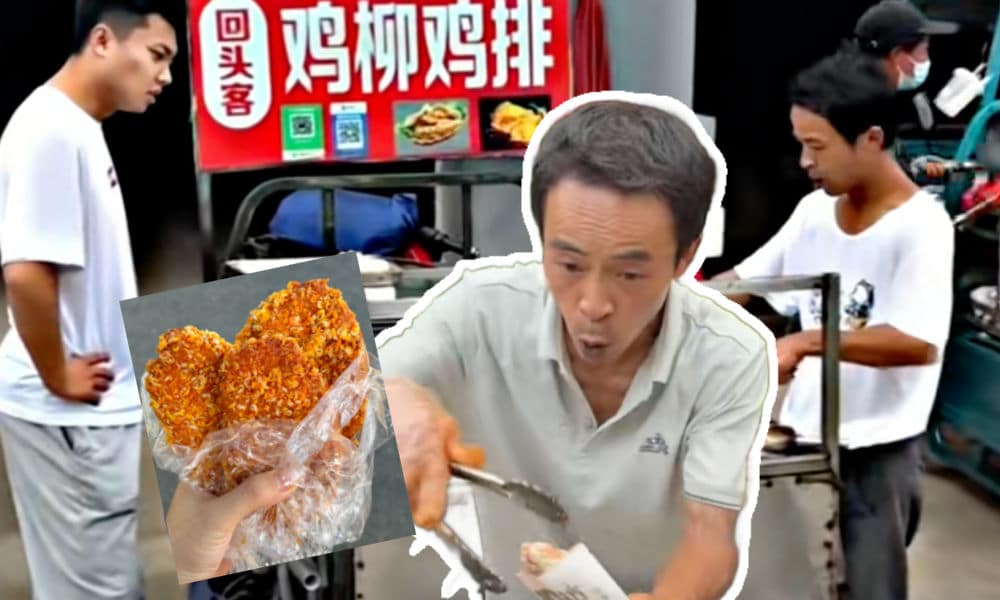
🔥 What’s Trending in China This Week? Stay updated with China Trend Watch by What’s on Weibo — your quick overview of what’s trending on Weibo and across other Chinese social media, curated by Manya Koetse.
What’s inside:
- 1. Jingdezhen’s “Chicken Chop Bro” Becomes Nationwide Meme
- 2. China’s 2025 Golden Week Travel Trends
- 3. China Faces Donkey Shortage Crisis
- 4. Word of the Week: “Ride-hailing for Relatives” 亲属打车 Qīnshǔ Dǎchē
- 5. What’s Inside at a Glance
1. Jingdezhen’s “Chicken Chop Bro” Becomes Nationwide Meme
From Beijing to Zibo, every now and then, food stall vendors go viral — for their charm, their uniqueness, and most of all, their tasty food. The star of this moment is 48-year-old Li Junyong (李俊永), who runs a small fried chicken stall in Jingdezhen, Jiangxi Province, with tight rules on who he serves, when, and how.
Li has suddenly become one of the most trending people on Chinese social media under the nickname “Chicken Chop Brother” (鸡排哥 jīpáigē).
Li initially gained popularity among customers for his frantic, multitasking energy — he doesn’t mess around when it comes to his chicken chop business, with superspeed and a clear order of serving customers (“I’ll first do you, then finish yours, then I’ll serve you 做完你的做你的”) and rules such as: no individual customers after 4:30 PM; students pay 1 yuan (about $0.15) less than regular passersby (after 12:00 PM, however, it costs 1 yuan more as punishment for being indecisive); and customers must open the plastic bag themselves before he puts the hot chicken cutlet inside.
The serious way he goes about dealing with his chicken chops almost makes you think he was making big business deals instead of selling to middle school students. In the end, it’s that attitude that gained him social media fame, as students started referring to him as “Head of Chicken Cutlet Operations” (free translation for 鸡排主理人 Jīpái gē Zhǔlǐrén).
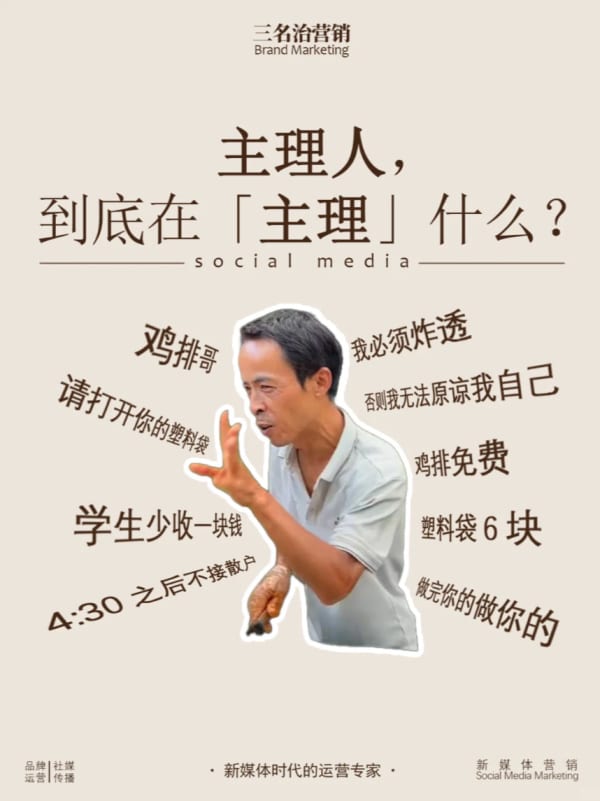
Head of Chicken Chop Operations: “Please open your plastic bag”, “No individual customers after 4:30 PM”, etc.
In light of Li’s explosive popularity, his chicken chop stall now sees extremely long queues, and local authorities and city management have had to intervene in order to control the crowds and keep the location safe.
There are definite downsides to such sudden fame, and Li is not the first street vendor this has happened to.
In 2023, for example, Beijing’s ‘Auntie Goose Legs’ (鹅腿阿姨) went viral, and the food stall owner became so overwhelmed that she temporarily had to take a break from her food stall, emotionally sharing how she said she felt too much pressure because of how the situation was unfolding, and that she just wanted to sell her goose legs in peace (“只想平平安安做烧烤”).
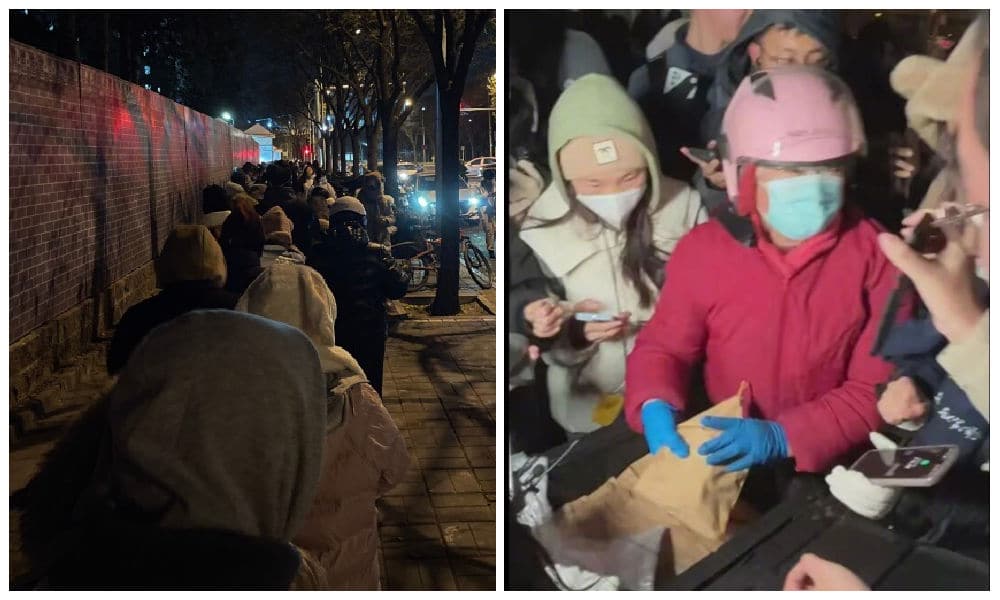
Long lines for Auntie’s goose legs.
It seems that “Brother Chicken Chops”, in line with his reputation as the chicken chop CEO, is trying to turn his viral moment into a sustainable business. According to Sina News, Li has drawn in relatives to help him. He reportedly has taught them how to make and sell his tasty fried chicken chops, and now his Chicken Chop Family (“鸡排家族”) has grown to a total of nine stalls.
Over the past week, Li has also joined several social media platforms, including Xiaohongshu, to build a social following that will last after the hype calms down.
Meanwhile, Li is the meme of the moment. As many Chinese workers experience working stress before the National Day holiday, they’ve used his superspeed working style videos to express the pressure they feel to finish all their deadlines. See videos here.
— What Else Is Trending —
2. China’s 2025 Golden Week Travel Trends

China’s longest holiday of 2025 is coming up, combining National Day (国庆节) and Mid-Autumn Festival (中秋节) into an eight-day Golden Week from October 1–8. If you’re traveling in China this week, good luck — the country’s transportation infrastructure is being pushed to its operational limits.
On September 30, the first “smart people” who opted to leave early to avoid traffic jams already found themselves stuck in them. China’s Ministry of Transport estimates a staggering 2.36 billion trips will be made during this period, with October 1 expected to see over 340 million travelers — surpassing the historical peak of 339 million recorded during Spring Festival earlier this year.
🔸 This week is going to see a lot of events. According to the Ministry of Culture & Tourism, more than 12,000 cultural activities will be held across China during the eight-day holiday period, including over 300 large-scale light shows.
🔸 Chinese local tourism offices are going all in on city marketing and are finding new strategies to make themselves more appealing to young travelers. Chengdu, for example, as Tencent’s gaming hub, is integrating the 10th anniversary of the super popular mobile game Honor of Kings (王者荣耀, Wángzhě Róngyào) into its cultural tourism strategy this year, organizing game-themed city walks, exhibitions, and more.
🔸 China’s travel platform Trip.com reported that interprovincial travel bookings have surged 45% year-on-year, with particularly strong interest in remote destinations like Xinjiang, Tibet, and Inner Mongolia. Searches for hotels in these regions jumped 60% compared to last year. This reflects a shift among middle-class Chinese tourists toward experiential travel and natural landscapes rather than crowded urban attractions.
🔸 The holidays are a time for relaxation, reunions, and eating mooncakes, but it’s also a stressful time for Chinese employers who must comply with labor regulations while managing workforce availability and overtime obligations. Under China’s Labor Law, employees working on statutory public holidays—October 1–3 and October 6 (the official Mid-Autumn Festival date)—must receive at least 300% of their normal daily wage. For adjusted rest days (October 4–5 and October 7–8), employers must provide either 200% overtime pay or compensatory time off. The State Council designated September 28 (Sunday) and October 11 (Saturday) as make-up workdays, but private companies have flexibility to adjust their own schedules.
3. China Faces Unprecedented Donkey Shortage Crisis

China is facing a serious donkey shortage. China’s donkey population is far below market demand, and the prices of donkey-related products continue to rise. The Donkey Branch of China’s Livestock Association (中国畜牧业协会驴业分会) addressed this issue in Chinese media earlier last week, telling China News Weekly (中国新闻周刊): “We have plenty of cattle and horses in China now — just not enough donkeys” (“目前我国牛马都不缺,就缺驴”).
China’s donkey population has plummeted by nearly 90% over the past decades, from 11.2 million in 1990 to just 1.46 million in 2023. The massive drop is related to the modernization of China’s agricultural industry, in which the traditional role of donkeys as farming helpers — “tractors” — has diminished. As agricultural machines took over, donkeys lost their role in Chinese villages and were “laid off.”
Donkeys also reproduce slowly, and breeding them is less profitable than pigs or sheep, partly due to their small body size.
As a result of China’s “donkey crisis,” the “donkey meat burgers” you order in China might actually be horse meat nowadays. Many vendors have switched — some secretly so (although that is officially illegal).
Efforts are underway to reverse the trend, including breeding incentives in Gansu and large-scale farms in Inner Mongolia and Xinjiang. China is also cooperating with Pakistan, one of the world’s top donkey-producing nations, and will invest $37 million in donkey breeding. However, experts say the shortage is unlikely to be resolved in the short term.
The quote that was featured by China News Weekly — “We have cows and horses, but no donkeys” (“牛马有的是,就缺驴”) — has sparked viral discussion online, not just because of the actual crisis but also due to some wordplay in Chinese, with “cows and horses” (“牛马”) often referring to hardworking, obedient workers, while “donkey” (“驴”) is used to describe more stubborn and less willing-to-comply individuals.

Not only is this quote making the shortage a metaphor for modern workplace dynamics in China, it also reflects on the state media editor who dared to feature this as the main header for the article. One Weibo user wrote: “It’s easy to be a cow or a horse. But being a donkey takes courage.”
4. “Ride-hailing for Relatives” 亲属打车 Qīnshǔ Dǎchē

Tencent has rolled out a new function via WeChat Mini Programs on September 26, aimed at helping seniors who struggle with app-based ride-hailing. Thanks to the new function, now live nationwide, users can order rides on behalf of older relatives directly in WeChat.
Adult children who want to help out their less tech-savvy (grand)parents or other senior relatives can now bind their account to their own, remotely pre-set pickup and drop-off locations, as well as payment methods, and track their journey for safety.
What makes this different from the possibility of just ordering a ride for someone else is that the seniors stay in control to some extent and can see their own journeys on their own phones. Children can configure settings on their side, while the interface for the elderly users is simplified. This allows seniors to ride independently, with a little help from their family.
The move is part of a broader effort in China to make it easier for seniors to stay involved in the digitalization of society.
The word to know is 亲属打车 qīnshǔ dǎchē, consisting of “亲属” qīnshǔ (relatives) and ride-hailing 打车 dǎchē.
5. What’s Trending at a Glance
- ✈️ The 27-year-old Sichuan creator “Tang Feiji” (唐飞机) died in a plane crash while livestreaming on Sept 27. The ultralight aircraft, piloted and purchased by Tang himself, went out of control and crashed before catching fire. Over 1,000 viewers were watching live, with the chat flooded by messages pleading for someone to rescue him. Local village officials confirmed his death. The tragedy is fueling debate over amateur aviation and extreme content creation.
- 🟢 Weibo has rolled out a visible “online status” feature on personal pages, showing when users are online, and not everyone is happy with it. The new feature is met with criticism from concerned users who don’t want others to see they’re online. It brings back memories of China’s legendary IM app QQ, which, like MSN, showed the online status of users.
- 🥿 A Chinese Marriott hotel location in Changzhou has come under scrutiny adn triggered hygiene concerns after guests found out that the in-room hotel slippers were being reused. The hotel has admitted to disinfected the disposable slippers and reusing them 2–3 times, without disclosing this to guests in advance.
- ⚖️ China’s cyberspace authorities issued stern warnings and announced penalties on various Chinese social platforms recently, including Xiaohongshu, Weibo, and Kuaishou, which are blamed for not keeping celebrity gossip and low-quality content in check and for influencing their hot search rankings. This is all about algorithm governance and the tightrope platforms walk in serving readers, attracting attention, and satisfying regulators.
- 👵 “Outsourced Children” services for Chinese seniors went trending recently. In Dalian, an initiative offering companionship and mediation services for seniors charges 500–2,500 yuan ($70–$350) per visit and has apparently been quite a success, underscoring strong market demand of eldercare-related services and new opportunities for Chinese students.
By Manya Koetse
(follow on X, LinkedIn, or Instagram)
Spotted a mistake or want to add something? Please let us know in comments below or email us. First-time commenters, please be patient – we will have to manually approve your comment before it appears.
©2025 Whatsonweibo. All rights reserved. Do not reproduce our content without permission – you can contact us at info@whatsonweibo.com.
China Trend Watch
Trending on Weibo: ‘731’ Movie, Actor Xie Mengwei Detained, Hangzhou Chemical Waste Death
Stay updated on China’s top social media trends this week (Sept 2025): “731” film record, Mukden anniversary, actor scandal, PKU probe & more.
Published
2 weeks agoon
September 18, 2025
🔥What’s Trending in China This Week (Week 38, 2025)? Stay updated with China Trend Watch by What’s on Weibo — your quick overview of what’s trending on Weibo and across other Chinese social media.
1. 94th Anniversary of September 18th “Mukden Incident” Commemorated Across China

Official media posters commemorating the “Mukden Incident.”
This week, China is commemorating the 94th anniversary of the so-called September 18th Incident (九一八事变), also known as the Mukden Incident. The incident, which occurred in 1931, marked the beginning of Japan’s invasion of Northeast China and the start of 14 years of Chinese resistance against Japanese occupation. In Liaoning Province, sirens sounded at exactly 9:18 AM, with citizens stopping to observe moments of silence. Social media was flooded with posts using hashtags like “Never Forget National Humiliation” (勿忘国耻) and calls for national strength and unity. The commemoration comes as China continues to emphasize historical education and national defense awareness among its citizens.
Manya’s Take:
The widespread focus on this particular historical anniversary is part of a greater official campaign in China to bring the historical memories of World War II in China to the forefront of the public memory. From social media hashtags to the military parade to cinema movies, the repeated message is: “Never forget” and “Always remember”, emphasizing that China’s suffering has brought the victory that led to its current status in the world today.
2. Film “731” Breaks Multiple Box Office Records on Opening Day

The movie posters for 731.
The much-anticipated war movie “731” shattered 10 box office records on its opening day, rapidly surpassing 200 million yuan in ticket sales. The movie, directed by Zhao Linshan (赵林山), depicts the horrific human experiments conducted by Japan’s Unit 731 during World War II in Northeast China. The film features actor Jiang Wu (姜武) in a leading role and has sparked widespread discussion about this particularly dark chapter of Second Sino-Japanese War. The movie’s initial success reflects continued Chinese interest in wartime history and the ongoing effort to preserve historical memory of Japanese war crimes. More about this in the upcoming newsletter.
3. Actor Xie Mengwei Detained for Livestreaming in Police Uniform
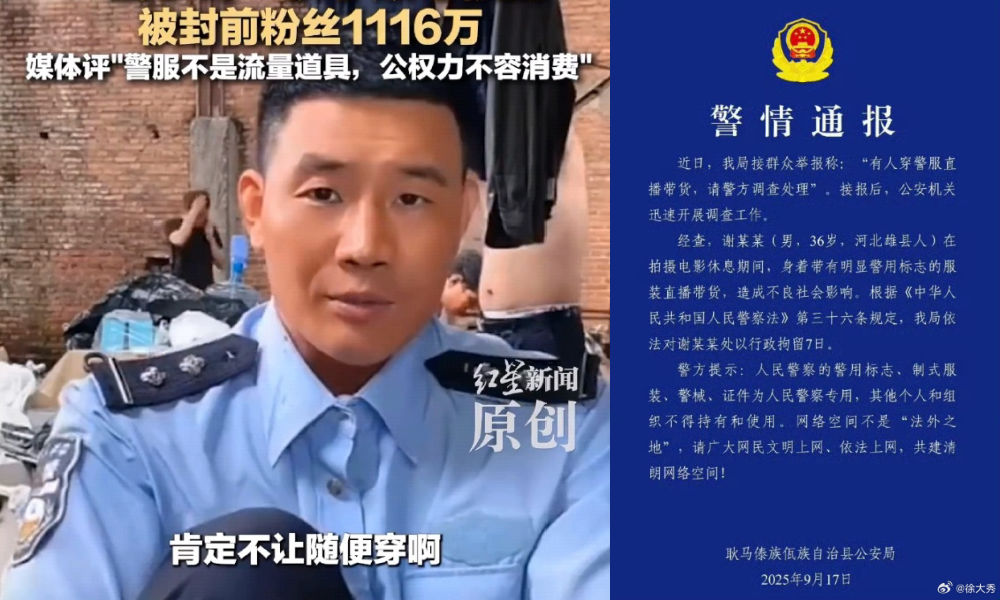
The actor during his livestream and the police report.
Chinese actor Xie Mengwei (谢孟伟), popularly known as “Gazige” (嘎子哥) due to his childhood role in the patriotic war drama Little Soldier Zhang Ga (小兵张嘎), was “administratively detained” for seven days for hosting a commercial livestream on the Chinese app Kuaishou while wearing police uniform. The actor was reportedly livestreaming during a break while on the set of upcoming Chinese anti-drugs film Drug Storm (缉毒风暴). Legal experts emphasize that police uniforms and equipment are restricted to official use only, and unauthorized wear violates public security regulations.
Xie claimed the uniform was a costume for the movie, but authorities rejected the explanation, stating the attire was worn outside filming and without proper clearance. The public video apology he gave was also criticized for failing to acknowledge the actual legal violation. In response to the controversy, the film’s producers have announced a complete reshoot of Xie’s scenes with a new actor. The actor also saw his livestream account on Kuaishou banned (#嘎子谢孟伟账号被封#).
Manya’s Take:
It’s clear that Xie has been turned into an example for other livestreamers in China, as authorities have taken a series of measures over the past few years to contain this thriving industry and ensure content stays in line with official guidelines. Xie’s case is now a cautionary tale, highlighting the Chinese government’s zero-tolerance stance on the misuse of state symbols. For Xie, the punishment is particularly harsh—not just the detainment, but practically the end of his career, as his name is now ‘tainted’ because of this scandal (see our article on Chinese ‘tainted celebrities’ here).
4. Peking University Vice President Under Investigation for Serious Violations
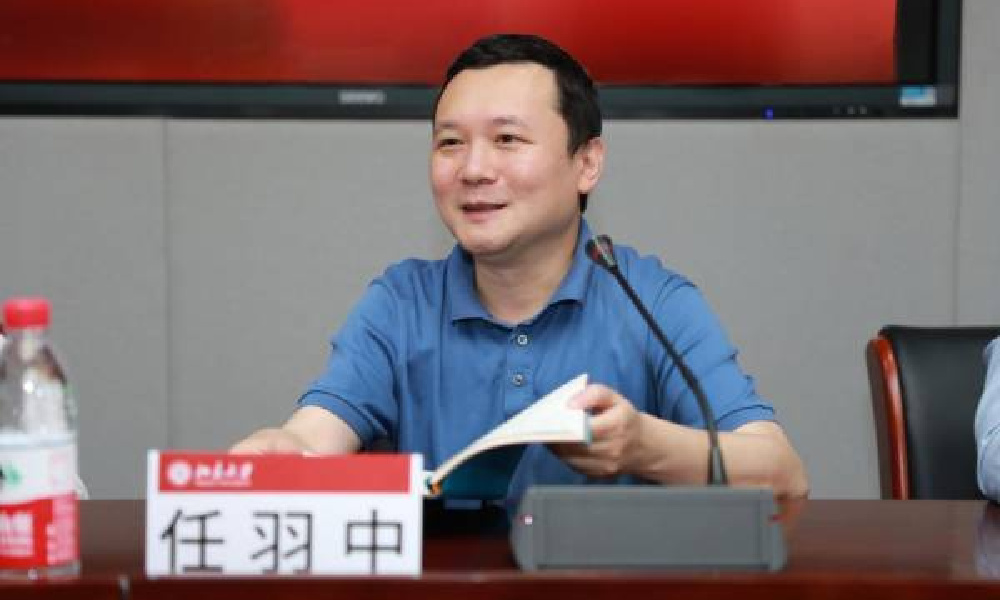
Ren Yuzhong (任羽中), image via Guancha.
Ren Yuzhong (任羽中), Executive Vice President and Standing Committee Member of the Communist Party Committee at China’s renowned Peking University (北京大学), has voluntarily turned himself in and is currently under disciplinary and supervisory investigation by the Central Commission for Discipline Inspection (中央纪委) and the National Supervisory Commission (国家监委) for suspected serious violations of law and party discipline. The announcement was made public on September 17.
Ren, born in 1980, rose from being a top scorer in Sichuan’s college entrance exam to earning his PhD from Peking University, eventually becoming the university’s first post-1980s vice president. He had only held the position since March 2024. Analysts view this as a deepening of China’s anti-corruption push into the education sector. Notably, his profile was removed from Peking University’s website a month before the announcement, and he had been absent from official meetings since July.
Manya’s Take:
Is this going to be the year of tackling corruption in Chinese academic circles? Earlier this year, a major scandal at Peking Union Medical College, a prestigious medical institution in Beijing, already triggered nationwide anger about fairness in education and corruption in academia. The dismissal of Ren Yuzhong is applauded by many who see it as a sign that even those in the higher positions at such renowned institutions cannot get away with corruption. “Check them, check them all!” some popular comments said.
5. After Deadly Incident, Hangzhou Authorities Track Down Abandoned Chemical Source

The demolished site in Yuhang where the woman went farming when she stepped on the plastic constainer. Image via The Paper.
Earlier this week, the death of a 52-year-old woman from Hangzhou drew national attention in China after she died from exposure to hydrofluoric acid, a highly toxic industrial chemical that netizens also refer to as “bone-dissolving water” (化骨水). On September 9, while she was out in a an abandoned area in Yuhang District (余杭区), she stepped on an old plastic barrel, causing residual acid from the barrel to splash onto her leg. Despite emergency hospital treatment, the woman died five days later from poisoning and organ failure.
Hangzhou authorities have now successfully identified the owner of the abandoned hydrofluoric acid. The man, a wall-cleaning contractor, illegally abandoned three barrels containing the highly dangerous acids back in 2015, when his father lived in the area. He has been detained and faces charges under China’s environmental protection and criminal laws.
Manya’s Take:
This case has mainly attracted so much attention due to widespread worries over the public’s lack of awareness regarding toxic chemicals and the ease with which such substances can be purchased online. In this case, one woman died — but the consequences can impact many more families. In 2016, for example, dozens of children fell seriously ill after their school had moved to a new ground that later turned out to be affected by toxic chemicals from a nearby chemical plant. About the current suspect in the Yuhang case, some netizens say he didn’t just kill one woman: “He put all of us in danger.”
This is the China Trend Watch series: trending topics curated by Manya, with help from our What’s on Weibo AI sidekick. AI tools — set up and customized by What’s on Weibo — help identify top trends and draft outlines, while Manya Koetse selects what’s most noteworthy, fact-checks, rewrites, and edits for context.
Spotted a mistake or want to add something? Please let us know in comments below or email us. First-time commenters, please be patient – we will have to manually approve your comment before it appears.
©2025 Whatsonweibo. All rights reserved. Do not reproduce our content without permission – you can contact us at info@whatsonweibo.com.
Subscribe
What’s on Weibo is a reader-supported publication, run by Manya Koetse (@manyapan), offering independent analysis of social trends in China for over a decade. To receive new posts and support our work, consider becoming a paid subscriber.

Get in touch
Would you like to become a contributor, or do you have any tips or suggestions? Get in touch here!

Jingdezhen’s “Chicken Chop Bro”, Golden Week Travel Trends & China’s Donkey Shortage Crisis

Evil Unbound (731): How a Chinese Anti-Japanese War Film Backfired
China’s Prefab Storm Explained: Luo Yonghao vs. Xibei & the Great Yùzhìcài Debate

Trending on Weibo: ‘731’ Movie, Actor Xie Mengwei Detained, Hangzhou Chemical Waste Death

China’s “Post Parade Afterglow”: 6 Social Media Trends

Hidden Cameras and Taboo Topics: The Many Layers of the “Nanjing Sister Hong” Scandal

“Jiangyou Bullying Incident”: From Online Outrage to Offline Protest

The Next Labubu: What the Rise of Wakuku Tells Us About China’s Collectible Toy Wave

A Very Short Guide to China’s Most Popular Designer Toys

The Rising Online Movement for Smoke-Free Public Spaces in China
Popular Reads
-

 China Memes & Viral3 months ago
China Memes & Viral3 months agoHidden Cameras and Taboo Topics: The Many Layers of the “Nanjing Sister Hong” Scandal
-

 China Books & Literature11 months ago
China Books & Literature11 months agoThe Price of Writing Smut: Inside China’s Crackdown on Erotic Fiction
-

 China Society12 months ago
China Society12 months agoDeath of Chinese Female Motorcycle Influencer ‘Shigao ProMax’ Sparks Debate on Risky Rides for Online Attention
-

 China Insight5 months ago
China Insight5 months agoUnderstanding the Dr. Xiao Medical Scandal


